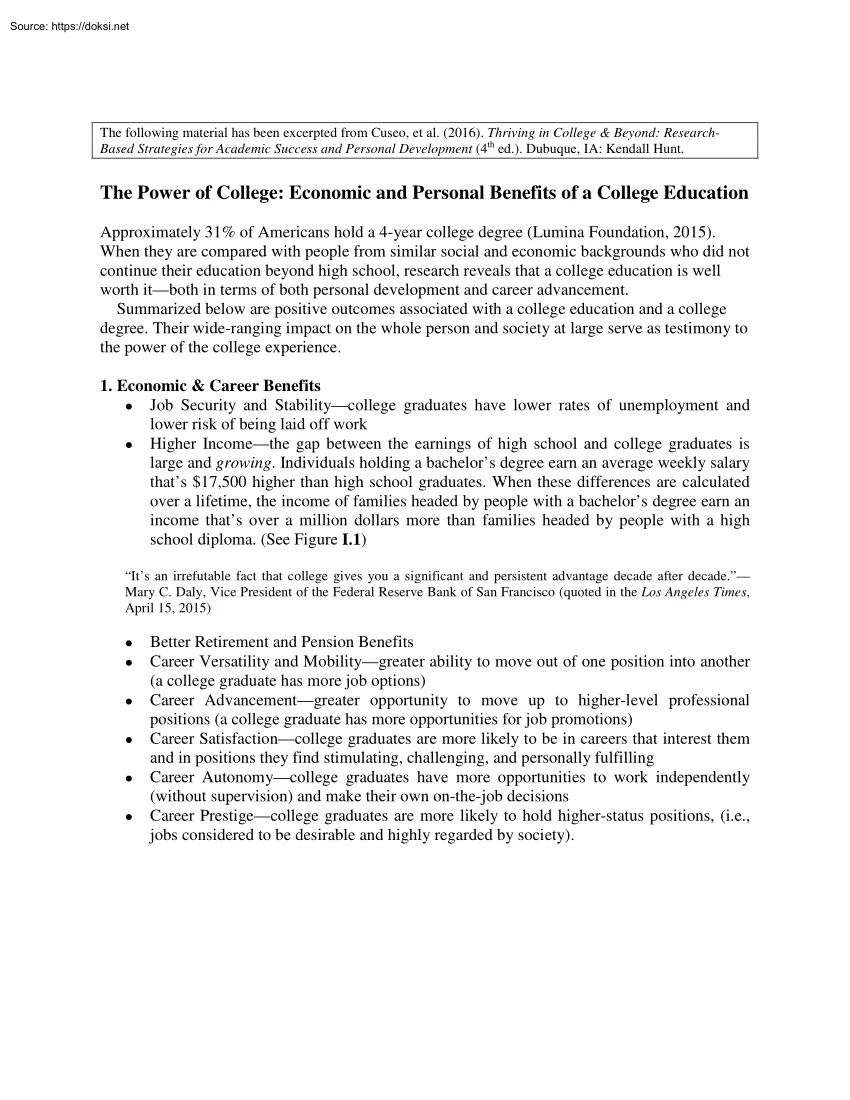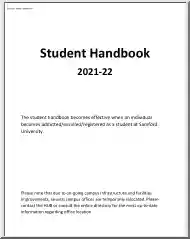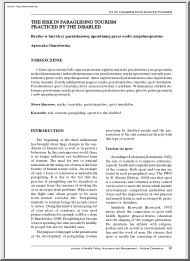Please log in to read this in our online viewer!

Please log in to read this in our online viewer!
No comments yet. You can be the first!
Content extract
The following material has been excerpted from Cuseo, et al. (2016) Thriving in College & Beyond: ResearchBased Strategies for Academic Success and Personal Development (4th ed) Dubuque, IA: Kendall Hunt The Power of College: Economic and Personal Benefits of a College Education Approximately 31% of Americans hold a 4-year college degree (Lumina Foundation, 2015). When they are compared with people from similar social and economic backgrounds who did not continue their education beyond high school, research reveals that a college education is well worth itboth in terms of both personal development and career advancement. Summarized below are positive outcomes associated with a college education and a college degree. Their wide-ranging impact on the whole person and society at large serve as testimony to the power of the college experience. 1. Economic & Career Benefits • Job Security and Stabilitycollege graduates have lower rates of unemployment and lower risk of being laid
off work • Higher Incomethe gap between the earnings of high school and college graduates is large and growing. Individuals holding a bachelor’s degree earn an average weekly salary that’s $17,500 higher than high school graduates. When these differences are calculated over a lifetime, the income of families headed by people with a bachelor’s degree earn an income that’s over a million dollars more than families headed by people with a high school diploma. (See Figure I1) “It’s an irrefutable fact that college gives you a significant and persistent advantage decade after decade.” Mary C. Daly, Vice President of the Federal Reserve Bank of San Francisco (quoted in the Los Angeles Times, April 15, 2015) • • • • • • Better Retirement and Pension Benefits Career Versatility and Mobilitygreater ability to move out of one position into another (a college graduate has more job options) Career Advancementgreater opportunity to move up to higher-level professional
positions (a college graduate has more opportunities for job promotions) Career Satisfactioncollege graduates are more likely to be in careers that interest them and in positions they find stimulating, challenging, and personally fulfilling Career Autonomycollege graduates have more opportunities to work independently (without supervision) and make their own on-the-job decisions Career Prestigecollege graduates are more likely to hold higher-status positions, (i.e, jobs considered to be desirable and highly regarded by society). Figure I.1 2. Advanced Intellectual Skills College graduates possess: • Greater knowledge • More effective problem-solving skillsbetter ability to deal with complex and ambiguous (uncertain) problems • Greater openness to new ideas • More advanced levels of moral reasoning • More effective consumer choices and decisions • Wiser long-term investments • Clearer sense of self-identitygreater awareness and knowledge of personal talents,
interests, values, and needs • Greater likelihood of learning continually throughout life “Without exception, the observed changes [during college] involve greater breadth, expansion, and appreciation for the new and different . and the evidence for their presence is compelling” Ernest Pascarella and Pat Terenzini, How College Affects Students 3. Physical Health Benefits • Better health insurancecollege graduates are more likely to have insurance coverage and have more comprehensive coverage • Better dietary habits • Exercise more regularly • Have lower rates of obesity • Live longer and healthier lives 4. Social Benefits • Greater social self-confidence • Better ability to understand and communicate effectively with others • Greater popularity • More effective leadership skills • Higher levels of marital satisfaction 5. Emotional Benefits • Lower levels of anxiety • Higher levels of self-esteem • Greater sense of self-efficacycollege graduates
believe they have more influence or control over the outcomes of their lives • Higher levels of psychological well-being • Higher levels of life satisfaction and happiness 6. Effective Citizenship • Greater interest in national issuesboth social and political • Greater knowledge of current events • Higher voting participation rates • Higher rates of participation in civic affairs and community service “The evidence is overwhelming that higher education improves people’s lives, makes our economy more efficient, and contributes to a more equitable society.” The College Board 7. Higher Quality of Life for Their Children • Less likely to smoke during pregnancy • Provide better health care for their children • Spend more time with their children • More likely to involve their children in stimulating educational activities that advance their cognitive (mental) development • More likely to save money for their children to go to college • More likely to have
children who graduate from college • More likely that their children attain higher-status, higher-salary careers “My three-month-old boy is very important to me, and it is important I graduate from college so my son, as well as I, live a better life” First-year student’s response to the question: “What is most important to you?” Sources: Andres & Wyn (2010); Astin (1993); Bowen (1977, 1997) ; Baum, Ma,, & Payea (2013); Dee (2004); Carnevale, Strohl, & Melton (2011); Feldman & Newcomb (1994); Hamilton (2011, 2014); Knox, Lindsay, & Kolb (1993); Lumina Foundation (2013, 2015); Pascarella & Terenzini (2005); Pew Research Center (2014); Seifert, et al. (2008); SHEEO (2012); The College Board (2013); The Hamilton Project (2014).; Tomasho (2009); US Bureau of Labor Statistics (2015) “For the individual, having access to and successfully graduating from an institution of higher education has proved to be the path to a better job, to better health and
to a better life.” College Board
off work • Higher Incomethe gap between the earnings of high school and college graduates is large and growing. Individuals holding a bachelor’s degree earn an average weekly salary that’s $17,500 higher than high school graduates. When these differences are calculated over a lifetime, the income of families headed by people with a bachelor’s degree earn an income that’s over a million dollars more than families headed by people with a high school diploma. (See Figure I1) “It’s an irrefutable fact that college gives you a significant and persistent advantage decade after decade.” Mary C. Daly, Vice President of the Federal Reserve Bank of San Francisco (quoted in the Los Angeles Times, April 15, 2015) • • • • • • Better Retirement and Pension Benefits Career Versatility and Mobilitygreater ability to move out of one position into another (a college graduate has more job options) Career Advancementgreater opportunity to move up to higher-level professional
positions (a college graduate has more opportunities for job promotions) Career Satisfactioncollege graduates are more likely to be in careers that interest them and in positions they find stimulating, challenging, and personally fulfilling Career Autonomycollege graduates have more opportunities to work independently (without supervision) and make their own on-the-job decisions Career Prestigecollege graduates are more likely to hold higher-status positions, (i.e, jobs considered to be desirable and highly regarded by society). Figure I.1 2. Advanced Intellectual Skills College graduates possess: • Greater knowledge • More effective problem-solving skillsbetter ability to deal with complex and ambiguous (uncertain) problems • Greater openness to new ideas • More advanced levels of moral reasoning • More effective consumer choices and decisions • Wiser long-term investments • Clearer sense of self-identitygreater awareness and knowledge of personal talents,
interests, values, and needs • Greater likelihood of learning continually throughout life “Without exception, the observed changes [during college] involve greater breadth, expansion, and appreciation for the new and different . and the evidence for their presence is compelling” Ernest Pascarella and Pat Terenzini, How College Affects Students 3. Physical Health Benefits • Better health insurancecollege graduates are more likely to have insurance coverage and have more comprehensive coverage • Better dietary habits • Exercise more regularly • Have lower rates of obesity • Live longer and healthier lives 4. Social Benefits • Greater social self-confidence • Better ability to understand and communicate effectively with others • Greater popularity • More effective leadership skills • Higher levels of marital satisfaction 5. Emotional Benefits • Lower levels of anxiety • Higher levels of self-esteem • Greater sense of self-efficacycollege graduates
believe they have more influence or control over the outcomes of their lives • Higher levels of psychological well-being • Higher levels of life satisfaction and happiness 6. Effective Citizenship • Greater interest in national issuesboth social and political • Greater knowledge of current events • Higher voting participation rates • Higher rates of participation in civic affairs and community service “The evidence is overwhelming that higher education improves people’s lives, makes our economy more efficient, and contributes to a more equitable society.” The College Board 7. Higher Quality of Life for Their Children • Less likely to smoke during pregnancy • Provide better health care for their children • Spend more time with their children • More likely to involve their children in stimulating educational activities that advance their cognitive (mental) development • More likely to save money for their children to go to college • More likely to have
children who graduate from college • More likely that their children attain higher-status, higher-salary careers “My three-month-old boy is very important to me, and it is important I graduate from college so my son, as well as I, live a better life” First-year student’s response to the question: “What is most important to you?” Sources: Andres & Wyn (2010); Astin (1993); Bowen (1977, 1997) ; Baum, Ma,, & Payea (2013); Dee (2004); Carnevale, Strohl, & Melton (2011); Feldman & Newcomb (1994); Hamilton (2011, 2014); Knox, Lindsay, & Kolb (1993); Lumina Foundation (2013, 2015); Pascarella & Terenzini (2005); Pew Research Center (2014); Seifert, et al. (2008); SHEEO (2012); The College Board (2013); The Hamilton Project (2014).; Tomasho (2009); US Bureau of Labor Statistics (2015) “For the individual, having access to and successfully graduating from an institution of higher education has proved to be the path to a better job, to better health and
to a better life.” College Board




 When reading, most of us just let a story wash over us, getting lost in the world of the book rather than paying attention to the individual elements of the plot or writing. However, in English class, our teachers ask us to look at the mechanics of the writing.
When reading, most of us just let a story wash over us, getting lost in the world of the book rather than paying attention to the individual elements of the plot or writing. However, in English class, our teachers ask us to look at the mechanics of the writing.